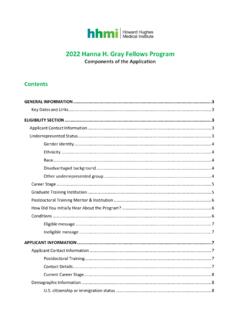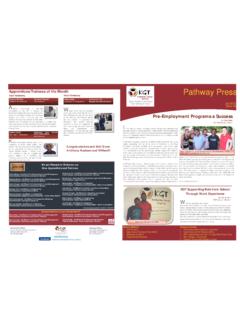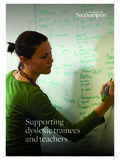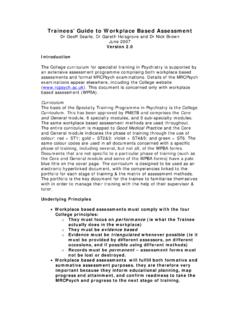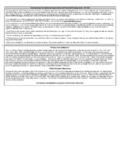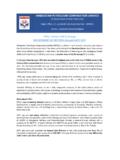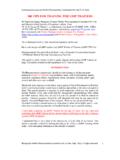Transcription of Making the Right Moves - hhmi.org
1 Second EditionMaking the Right MovesA Practical Guide to Scientif c Managementfor Postdocs and New FacultyBurroughs Wellcome FundHoward Hughes Medical Institute 2006 by the Howard Hughes Medical Institute and Burroughs Wellcome FundAll rights 08 07 06 1 2 3 4 5 Permission to use, copy, and distribute this manual or excerpts from this manual isgranted provided that (1) the copyright notice above appears in all reproductions; (2)use is for noncommercial educational purposes only; (3) the manual or excerpts are notmodified in any way; and (4) no figures or graphic images are used, copied, or distrib-uted separate from accompanying text. Requests beyond that scope should be directedto views expressed in this publication are those of its contributors and do not neces-sarily reflect the views of the Howard Hughes Medical Institute or the BurroughsWellcome manual is also available online at Developers: Maryrose Franko, , and Martin Ionescu-Pioggia, :Laura Bonetta, Editor: Patricia DavenportProduction Manager:Dean TrackmanDesigner: Raw Sienna DigitalWriters:Joan Guberman, Judith Saks, Barbara Shapiro, and Marion TorchiaCopyeditors:Cay Butler and Kathleen Savory Indexer: Mary E.
2 CoeHoward Hughes Medical Institute4000 Jones Bridge RoadChevy Chase, Maryland 20815-6789 Wellcome Fund21 Box 13901 Research Triangle Park, North Carolina27709-3901 BWFuHHMI97 Chapter 5 MENTORING ANDBEING MENTOREDAs a principal investigator, you probably will hire technicians, assume responsibilityfor the direction of graduate students, and take on a few postdocs. In addition, yourundergraduate students may look to you for guidance about careers in science. It salso possible that young scientists outside your lab may begin knocking on your ofthese individuals may look to you as a mentor. At the same time, you willcontinue to be in need of guidance for your own continuing professional develop-ment.
3 This chapter describes the process of mentoring, with the focus on mentoringthe people working in your lab. It also suggests desirable personal qualities and plansof action for both mentors and trainees. (Note: In this chapter, the people you men-tor are referred to as trainees, although not everyone you mentor may be receivingtraining in your lab.)WHAT IS MENTORING?Scientific mentoring is a personal,one-on-one relationship between a more experi-enced scientist and a junior scientist or a scientist-in-the- Making . The mentor isexposed to the trainee s energy and ideas, and the trainee receives the guidance andencouragement necessary for professional development. Mentoring relationshipscommonly form across broad experience gaps , professor to student but alsocan be established between peers or near peers.
4 For example, a graduate studentwhose background is in biology may serve a laboratory mentoring role for a graduatestudent whose background is in mathematics, or a graduate student may mentor usually include those who are officially responsible for the work of juniorscientists or students, such as the principal investigator or a formal adviser. However,it s also important to have mentors who are outside the direct line of authority. Thesementors can be especially helpful in providing guidance when formal advising rela-tionships become strained or when the personal or professional interests of thetrainee differ from those of the formal only does mentoring benefit the trainee ,it also benefits the mentor.
5 As a mentor,you derive personal satisfaction in helping nurture the next generation of the Right Moves A Practical Guide to Scientific Management98 BWFuHHMIYour scientific achievements are carried forward by those you have mentored. Asyour trainees embark on new projects, you are naturally kept abreast of the latestscientific developments. In addition, your professional network expands as yourtrainees expand their professional of a Good MentorGood mentors often share some of the following personal qualities:u Accessibility:An open door and an approachable Empathy:Personal insight into what the trainee is Open-mindedness:Respect for each trainee s individuality and for workingstyles and career goals different from your Consistency:Acting on your stated principles on a regular Patience:Awareness that people make mistakes and that each personmatures at his or her own Honesty:Ability to communicate the hard truths about the world outthere and about the trainee s Savvy.
6 Attention to the pragmatic aspects of career in MentoringAs a mentor,you may be privy to a lot of information about your trainees, fromtheir past professional accomplishments and failures to their personal relationshipsand financial situation. You should treat all information as confidential. Your traineesshould feel that they can trust you with whatever problems they share with MENTOR S RESPONSIBILITIESM entoring entails substantial commitments oftime,energy, and good will. A sig-nificant portion of your time must be allocated to each trainee , and you must beprepared to obtain the resources the trainee needs. In addition, you should use yourexperience and contacts to help the trainee establish a professional Whom to MentorYou will have to make case-by-case judg-ments about which mentoring relationshipsyou can afford to enter into and how inten-sive each one should be.
7 There are some peo-ple for whom you are clearly responsible,such as the people working in your in your courses also have legitimateexpectations of you. Others, outside your labor courses, may come to you for :How do I say no to being someone smentor?Answer:Be kind:Imagine yourself in yourrequestor s shoes. Listen to them intently andgive reasons related to your own , be clear and firm. Do not invite misun-derstanding. Suggest alternative sources of help,but check first with the potential 5 Mentoring and Being MentoredBWFuHHMI99 Some people are more promising than others, and you want to nurture their have interests closely related to yours, and it is natural for you to want towork closely with them.
8 Still others show promise but are needy in some respect;for example, their skills are not fully developed or they need help focusing theirefforts. With the people in your lab, the important thing is to be fair and avoidfavoritism. With the people outside your lab, you need to avoid overextending your-self or setting up expectations you can t Your Role as a MentorGenerally speaking, a mentor provides whatever is needed to further a trainee sprofessional development but is not necessarily a friend. You should offer to teachtechnical skills, give advice about the political aspects of science, and suggest net-working opportunities, but you should probably not offer advice on personal mat-ters.
9 Often, emotional issues are relevant to one s work, and you can offer moralsupport, but a good mentor treads Versus AdviserIn theory, mentors have multiple responsibilities being an adviser is one of to the Council of Graduate Schools ( ) mentors areu Advisers:People with career experience willing to share their Supporters:People who give emotional and moral Tutors:People who give specific feedback on one s Masters:Employers to whom one is Sponsors: Sources of information about opportunities and aid in Models of identity:The kind of person one should be to be an academic or aprofessional of the lessons is that my job is not to be their best job is to be their mentor, and my job is to be their boss I had this sort of egalitarian thing where I wastrying to run a professional laboratory, but I was also wantingto be buddies with I have come to realize the alter-native to have a little distance.
10 Things work better if it s clearthat I am the head of the lab. Charles Murry, University of Washington Schoolof Medicine Making the Right Moves A Practical Guide to Scientific Management100 BWFuHHMIIn reality, it is unlikely that any one individual can fulfill all possible mentoringroles. For this reason, many argue that the term mentor should be used broadly tomean an individual who helps another with one or more aspects of his or her per-sonal or professional development or both. In this sense, trainees are encouragedto seek out various faculty who can provide some of these FOR EFFECTIVEMENTORING IN YOUR LABMake Everything a Learning OpportunityIt helps to think of mentoring as a highly individualized mode of teaching.



